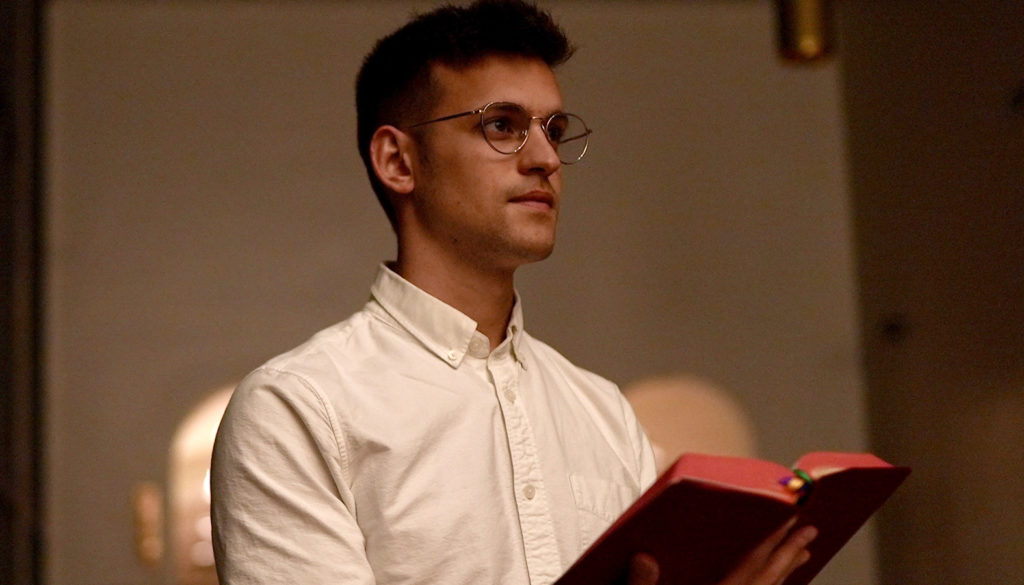“Sing the Hours” (singthehours.org), a platform designed to help people sing the Divine Office, is the brainchild of Paul Rose, a young convert from the Boston area.
The Office, musical by nature, follows a “Psalter,” a methodical, universally observed cycle. Priests, monks, and nuns are pledged to pray the Office at several set “hours” of the day. The Second Vatican Council emphasized that it should be the prayer of laypeople as well.
Each day “Sing the Hours” offers lauds and vespers, the “hinge” Offices.
On his YouTube channel, Rose introduces himself like this: “Hi all! I’m here to serve and glorify God with prayer. The Liturgy of the Hours is the public prayer of the Universal Church! To pray the Liturgy of the Hours — also called the Divine Office — is to enter into the intimate conversation of God’s family.”
Rose’s voice is clear, beautiful, and refreshingly noncloying. He’s not trying to sound holy. You sense that prayer is an integral part of his life and he is longing to share it.
The YouTube background might be of a snow-shrouded statue of the Virgin Mary, or the branch of a flowering apple tree, or a bank of candles flickering before an icon of Jesus.
Following along is easy as the text is displayed throughout: the Invitatory (in Latin), hymn, and Psalms; the Glory Be (also in Latin), the reading, the Benedictus or Magnificat, and the Lord’s Prayer. Often Rose will close with a song to Mary: the “Salve Regina” or an “Ave Maria.”
In a May 4, 2021, interview with a Deacon Ryan from Canada, Rose — earnest, passionate, articulate, and almost goofily endearing — offers the backstory of his venture.
He was raised as what he calls a “post-modern,” nondenominational Christian. In high school, he was “beckoned to the Church by the Holy Spirit.” For 10 years, he and his brother had run a company that worked with kids to give them public speaking and debate skills. But around 2020, he “was kind of on burnout and also wanted to do something more evangelical with my time.”
He was also in “a quarter-life crisis”; a space of great desolation, both spiritually and personally. He’s an extreme extrovert and the pandemic had worn him down.
So he took a sabbatical of several months to discern what his next step should be. For his birthday that year, Dec. 30, his sister gave him a breviary set. And when he started praying and singing the Office, everything changed.
“There’s a great letter from Church Father and doctor St. Athanasius to Marcellinus where he discusses the Psalms. It’s not for our entertainment that we sing our Psalms, it’s for the soul’s own benefit.”
In the midst of the darkest period of his life, he realized it was impossible simultaneously to sing the Psalms and to feel despondent. “You’re breathing, moving, standing. It’s a perfect integration before God of body, soul, and spirit. But it’s not just a mental health tool or a way to find peace, it’s a way to worship God.”
Nonetheless, after a few months, he realized he was probably singing the Psalms wrong. He started asking around and searching online — podcasts, Instagram, YouTube — and he found there was literally nothing: no guide, no materials.
In high school, he’d been interested in music, music production, and voice. He began to realize: “I can sing, I can produce — why not just pray the Office myself and make it available to other people?”
He started posting during Advent of 2020. His early efforts were awful, he says. A friend told him he sounded like Justin Bieber — if Bieber had converted to Catholicism and become a monk. He quickly began adopting a more “traditional” tone — though, trained in pop vocals, his singing is always going to have a bit of “modern charm,” as he laughingly puts it.
More and more, he realizes, the entire human experience is contained in those 150 Psalms: our suffering, our joy, our thanksgiving, our angst. They were written by David, Christ’s ancestor, and Christ prayed them himself.
“The prayer is timeless but it enters time in our contemporary English language context.”
At the behest of his mother, Rose and his siblings also learned Latin as children. Bits of that he’s also incorporated into “Sing the Hours.”
“Think of how many thousands of saints have prayed the ‘Glory Be’ throughout history in Latin — at work in the fields, before the altar, about to be burned at the stake. It’s so great to close each Psalm with that eternal shout-out.”
Rose’s enthusiasm is contagious. His conviction that God had a plan for his dark night of the soul is a consolation. That he took the resources at hand — his musical talents, his energy, his faithful heart — and molded them into an ongoing daily labor of love is a lesson and an inspiration to all of us.
In the Passion according to John, Jesus and his disciples sit down to the Last Supper. His time is at hand. “One of you will betray me,” he tells them. He will not again together drink the fruit of the vine until they meet in the Father’s kingdom.
Then he takes a moment to integrate himself fully before God — body, soul, spirit — and forever enshrines the glory of music.
“And when they had sung a hymn, they went out to the Mount of Olives.”

